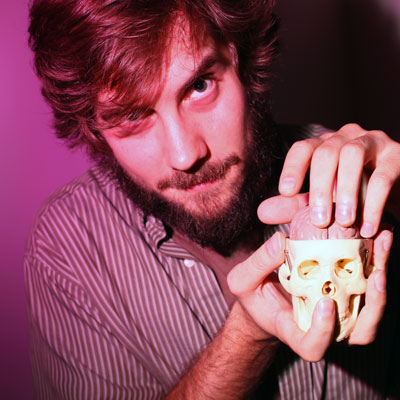 |
| Heath Matheson and Nicole White write a blog about the psychology of horror films. (Bruce Bottomley Photo) |
One of Heath Matheson’s earliest childhood memories is a nightmare—literally.
“I remember accidentally watching a horror film and having a dreadfully terrifying dream,” he says. “It was the second Friday the 13th movie. I was at a sleepover, which was the only way I could have seen this movie because my parents never would have let me watch anything like it; I think I was about four or five. (In the dream) the killer’s arm came through the wall and he grabbed me, dragging me through the wall. I woke up in tears and my parents had to be called.”
Not the most auspicious beginning to a life as a horror movie fan, but his fear quickly ignited into a passion for the genre that he even carries with him into his studies. A PhD student in cognitive neuroscience, he’s recently started a blog with his parter Nicole White—herself a former Dal neuroscience student now at the University of Toronto—all about the psychology of horror films.
“I think it’s because out of the movies you might watch, the phenomena that we end up often studying in psychology—things like fear—are explicit topics in these movies. They discuss things like, for instance, whether a brain could exist in a vat, or something like that. And those are the types of philosophical questions that we might ask ourselves here.”
The blog——doesn’t just deal with the obvious slasher culprits like Jason, Freddy and Michael Myers. The pair writes about movies that pique their scholarly interests, from recent pictures like Splice and The Human Centipede to older films you might never have heard of, like Peeping Tom or The Brain Machine, both from the 1960s.
“We pick the movies, discuss them and pass our thoughts back and forth,” says Mr. Matheson, adding that their goal is to integrate psychological theory—for instance, linking scholarly work on the relationship between testosterone and aggressive with the gender-switching ideas of this year’s Splice—in a way that’s simple and easy for genre fans to understand.
“it’s really important to me to engage in science outreach, making science accessible and available to a public that doesn’t get to spend all their time reading journal articles on the topic.” He adds that he invites readers to comment and engage in a dialogue about the movies on the blog.
Mr. Matheson also does work with the HÂţ» chapter of Let’s Talk Science, and is looking into ways to integrate some of the more silly and age-appropriate classic horror films into the outreach program's high school initiatives. He’s also working through his New Year’s resolution: watching all of Vincent Price’s films this calendar year.
LINK:
